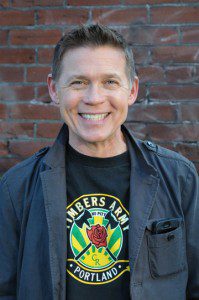 Tom Krattenmaker has lived on the margins of religious culture much of his life, and now he finds himself in the center of the evangelical Christian conversation. Tom is taking part in our Author Meet & Greet series at First Christian Church, Portland on September 25th at 6PM (a free event), so I put a handful of questions to him about how he got into such an unlikely line of work.
Tom Krattenmaker has lived on the margins of religious culture much of his life, and now he finds himself in the center of the evangelical Christian conversation. Tom is taking part in our Author Meet & Greet series at First Christian Church, Portland on September 25th at 6PM (a free event), so I put a handful of questions to him about how he got into such an unlikely line of work.
You describe yourself as a “secular-ish progressive” who seems fascinated for some reason with writing about Christian evangelicals. Why?
At the surface level, my fascination stems from evangelicals being a “big story” in the journalistic sense. They have the numbers, the energy and commitment, the attention of politicians. Developments within this sizable and influential subset of America are big news. I’ve also been curious for many years about why evangelicals believe what they believe and act as they act. How come I never came to believe in the same way even though I grew up in the same culture, was exposed to many of the same influences, and had the “case for Christ” presented to me many times? This has always been a source of puzzlement and fascination for me.
When I first came out of the gates writing about evangelicals, my fascination was negative. I was galled by the strong attachment to right-wing politics, the Iraq war, partisan prayer. I felt I needed to speak out and expose what was wrong, and that’s what I did in my first set of columns about evangelicals and in my first book, to some degree. But as I continued to explore what was happening in evangelical America, I started to come upon more and more stories and ideas that were refreshing and uplifting. I was talking with evangelicals who did not fit the negative stereotypes at all and who were up to some really fascinating things. So then I wanted to tell that story, which is what my new book is all about.
You also identify with something you call the “Radical Middle.” What is that?
I love that term “radical middle” because it seems at war with itself. Isn’t the middle the opposite of radical? Not necessarily, and that’s why the term is so brilliant. I didn’t even stumble upon the term and start using it until after my new book was written. I realized I described the radical middle in my book without even knowing it. The radical middle is where the new evangelicals are spending their time, and that’s where I’ve been going to interact with them.
As I argue in the closing passage of my book, the middle today is not some “mushy middle” for the commitment-phobic and weak-kneed. It’s more like a no-man’s land. When you go there, you face fire from both sides. But you meet some fascinating people who are doing some radically positive things. Things that might seem utterly impractical and even crazy. But they’re awesome and, I would say, very Jesus-like.
I would add that Portland is becoming quite an epicenter for the radical middle. A prime example is the way the liberal gay mayor Sam Adams (now ex-mayor because his term ended) teamed up with the evangelical churches, both sides breaking the culture-war rules of the game, to do good for the community.
For your book, “The Evangelicals You Don’t Know,” you made an interesting trip to Focus on the Family. Why was it so important to you to go there and meet with their leadership?
One of the more surprising and uplifting things about the radical middle is the way people let their defenses down and actually reach out to the “ enemy,” maybe even apologizing to them (gasp!). It’s a big theme in my new book—this on-going act of apology by which evangelicals are confessing the sins of the church, if you will, to gay people and others who have been mistreated by evangelical Christians. You guys at First Christian Church don’t need to be told about the power of apology, Christian! There’s a chapter in the middle of my book called “Confession Booth” where I explore this confession phenomenon and the various misdeeds for which evangelicals are apologizing.
In that spirit, I decided I was going to reciprocate and devote a big part of my closing chapter to my own imaginary or literary confession booth, where I would talk about, and apologize for, ways in which my progressive side has mistreated evangelicals. While in the early stages of the writing, I was on a hike with a friend and telling him about this literary confession booth I was planning. And he said, “No, Tom, you have to do a real confession. That would be so much better.” I was really struck by that. As an evangelical might term it, I was convicted. After a long process of figuring out where and how to do it, and in front of whom, I decided to do it at Focus on the Family, which I had long treated as the enemy. For me and the people in my circles, that was radical.
Obviously, if James Dobson was still the head of Focus, I would not and could not have done it. Their new leader, Jim Daly, is a much different kind of guy, even while maintaining his evangelical and conservative bona fides. And the approach I took was informal. In addition to interviewing Daly and asking some hard questions, I candidly acknowledged ways in which Focus continues to be unfairly demonized by liberals and said, essentially, it sucks that they’re subject to that mistreatment by my side.
What is it that we mainline Christians don’t know about evangelicals that we should?
There’s a widening stream of what I call “new evangelicals” who are changing the public expression of evangelical Christianity in profound and positive ways. Younger evangelicals, in particular, defy and subvert many of the stereotypes that hold sway among non-evangelicals. They’re not politically right wing. They’re not anti-science. They feel called to protect the environment. They heed Jesus’ call to care for the poor and vulnerable and abused. Here’s an important thing to know: They are not against people outside their evangelical culture and, in fact, are interested in new friends and allies and coalition partners to get good things done for their communities and fellow citizens. The walls of insularity are breaking down fast.
What do you hope ultimately to achieve with your work in this area?
I want to encourage progressive non-evangelicals, especially those with a simplistic and negative view of evangelicals—which used to be my view—to complicate and update their understanding of these people. A new time is setting in, and the lines of conflict and division are shifting. There is great potential for us to work with these new evangelicals for the common good. Hopefully, my book will help make that possible.
Tom Krattenmaker is a Portland-based writer specializing in religion in public life and an award-winning religion columnist for USA Today. Krattenmaker is the author of Onward Christian Athletes, a Foreword Reviews Book of the Year for 2009, and winner of the 2013 Hunderup Award for Religious Education from Ecumenical Ministries of Oregon. His second book, The Evangelicals You Don’t Know, was published in April, 2013.












